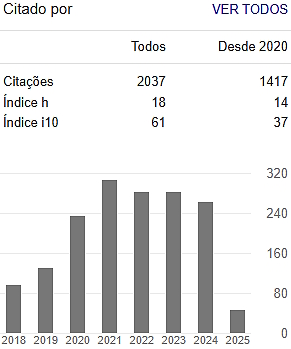THE SOCIAL REPERCUSSION OF CULTIVATED (CELL-BASED) MEAT
Palavras-chave:
animal welfare, sustainability, development of cellular meatResumo
This document addresses the different perspectives about the social repercussion of cultivated meat. This topic is current and there are conflicting points of view related to it. Even though food culture is passed down over generations, it is continually changing due to the introduction of new food products in the market and changes in consumers’ habits. Population projections indicate accelerated and continuous growth in the coming decades, which should increase the demand for food in general. Research is being developed in search of meat made of animal cells or plants with the sensory characteristics of the bovine product, mainly in the United States, Israel, European Union and China. We suggest some objectives and variables that would be interesting to measure to monitor the impacts of this theme in South America. The initial idea is to suggest to work with different approaches to build broad knowledge, in the first moment. Obviously, that can be done with many adaptations and qualifications. This document presents initial ideas designed to contribute to and support productive diversification and food sovereignty. It is a document that suggests ideas and discussions, based on the literature with quality results.
Downloads
Referências
BEKKER GA, FISCHER ARH, TOBI H, VAN TRIJP HCM. Explicit and implicit attitude toward an emerging food technology: the case of cultured meat. Appetite 108:245–254, 2017.
BETORET E, BETORET N, VIDAL D, FITO P. Functional foods development: trends and technologies. Trends in Food Science & Technology 22:498e508, 2011.
BOBECK, E. A. Functional nutrition in livestock and companion animals to modulate the immune response. Journal of Animal Science, 2020.
CARR, A. C.; S. MAGGINI. Vitamin C and immune function. Nutrients 9:11 doi: 10.3390/nu9111211, 2017.
CARDOSO, I; MALAFAIA, G. Inteligência competitiva da cadeia da carne bovina. In Embrapa Gado de Corte (ALICE). In: Jornada Científica EMBRAPA Gado de Corte, 14., 2018, Campo Grande-MS. Brasília, DF, 115 p. (Embrapa Gado de Corte. Documentos, 258), 2018.
DALL-ORSOLETTA, A. C., ALMEIDA, J. G. R., CARVALHO, P. C., SAVIAN, J. V., & RIBEIRO-FILHO, H. M. Ryegrass pasture combined with partial total mixed ration reduces enteric methane emissions and maintains the performance of dairy cows during mid to late lactation. Journal of Dairy Science, 99(6), 4374-4383, 2016.
DE SOUZA FILHO, W., DE ALBUQUERQUE NUNES, P. A., BARRO, R. S., KUNRATH, T. R., DE ALMEIDA, G. M., GENRO, T. C. M., ... & DE FACCIO CARVALHO, P. C. Mitigation of enteric methane emissions through pasture management in integrated crop-livestock systems: trade-offs between animal performance and environmental impacts. Journal of Cleaner Production, 213, 968-975, 2019.
FREWER, L. J., BERGMANN, K., BRENNAN, M., LION, R., MEERTENS, R., ROWE, G., ... & VEREIJKEN, C. M. J. L. Consumer response to novel agri-food technologies: Implications for predicting consumer acceptance of emerging food technologies. Trends in Food Science & Technology, 22(8), 442-456, 2011.
HAPPER, C., & WELLESLEY, L. Meat consumption, behaviour and the media environment: a focus group analysis across four countries. Food Security, 11(1), 123-139, 2019.
KIM, E. Annual Report & Reader: New Harvest [New Harvest]. New York, New York, 2017.
MOUAT, M. J., & PRINCE, R. Cultured meat and cowless milk: on making markets for animal-free food. Journal of Cultural Economy, 11(4), 315-329, 2018.
PHILIPPON D.J. Changing food cultures, changing global environments. Global Environmental 11:4–11. https://doi.org/10.3197/ge.2018.110101, 2018.
REIS, G. G., HEIDEMANN, M. S., BORINI, F. M., & MOLENTO, C. F. M. Livestock value chain in transition: Cultivated (cell-based) meat and the need for breakthrough capabilities. Technology in Society, 101286, 2020.
RIBEIRO, C. D. S. G. & CORÇÃO, M. O consumo da carne no brasil: entre valores sócios culturais e nutricionais. Demetra: alimentação, nutrição & saúde, 8(3), 425-438, 2013.
ROHR, J. R., BARRETT, C. B., CIVITELLO, D. J., CRAFT, M. E., DELIUS, B., DELEO, G. A., ... & REMAIS, J. V. Emerging human infectious diseases and the links to global food production. Nature Sustainability, 2(6), 445-456, 2019.
SPECHT, L.; LAGALLY, C. Mapping Emerging Industries: Opportunities in Clean Meat [The Good Food Institute], 2017
STEPHENS, N., DI SILVIO, L., DUNSFORD, I., ELLIS, M., GLENCROSS, A., & SEXTON, A. Bringing cultured meat to market: Technical, socio-political, and regulatory challenges in cellular agriculture. Trends in Food Science & Technology, 78, 155-166, 2018.
VASCONCELOS, K., FARINHA, M., BERNARDO, L., LAMPERT, V. D. N., GIANEZINI, M., DA COSTA, J. S., ... & RUVIARO, C. F. Livestock-derived greenhouse gas emissions in a diversified grazing system in the endangered Pampa biome, Southern Brazil. Land use policy, 75, 442-448, 2018.
ZHOU, C., ELSHKAKI, A., & GRAEDEL, T. E. Global human appropriation of net primary production and associated resource decoupling: 2010–2050. Environmental science & technology, 52(3), 1208-1215, 2018.
ZIDARIČ, T., MILOJEVIĆ, M., VAJDA, J., VIHAR, B., & MAVER, U. Cultured Meat: Meat Industry Hand in Hand with Biomedical Production Methods. Food Engineering Reviews, 1-22, 2020.
ZYCHERMAN, A. To beef or not to beef: defining food security and insecurity in Tucumán Argentina. Ecological and Environmental Anthropology (University of Georgia), 30, 2008.
Downloads
Publicado
Edição
Seção
Licença
Copyright (c) 2022 Colloquium Agrariae. ISSN: 1809-8215

Este trabalho está licenciado sob uma licença Creative Commons Attribution-NonCommercial-NoDerivatives 4.0 International License.

